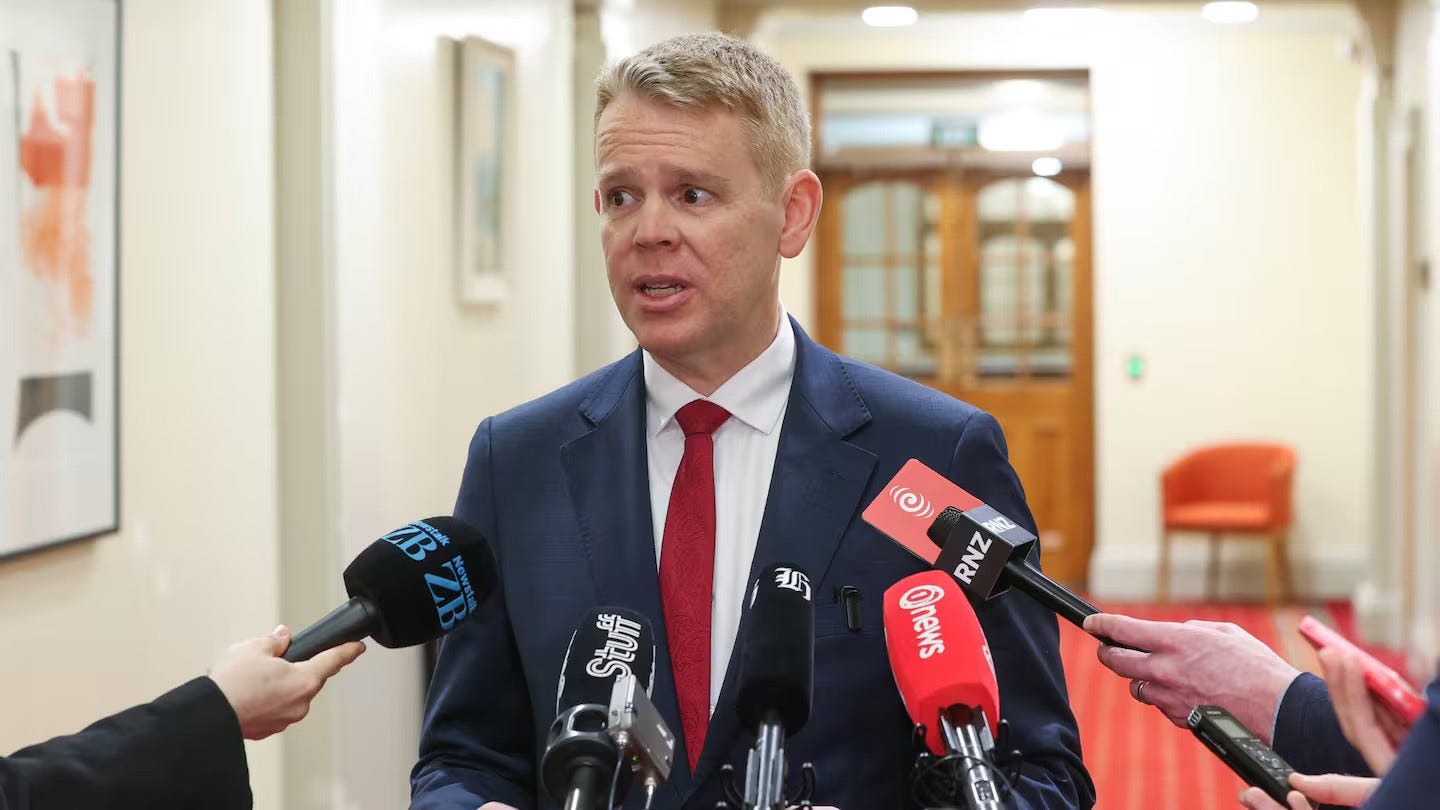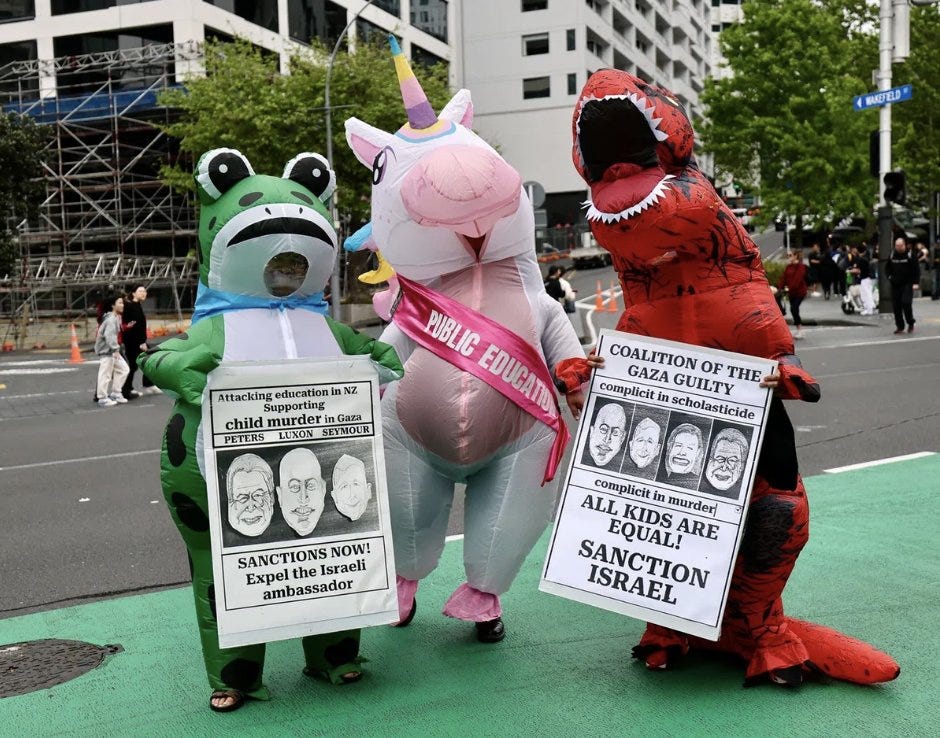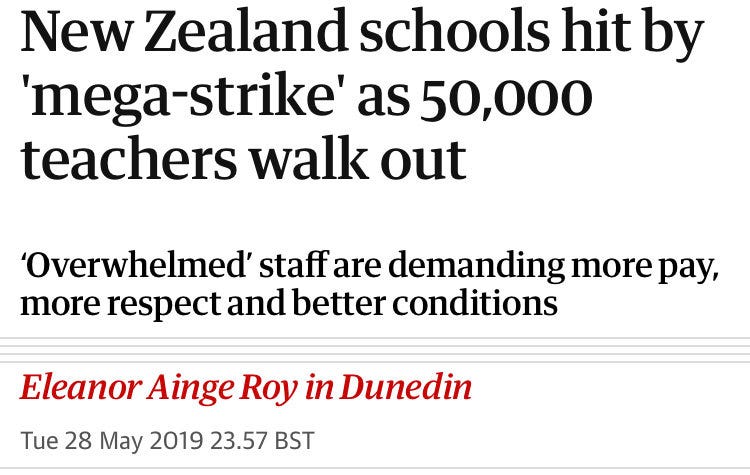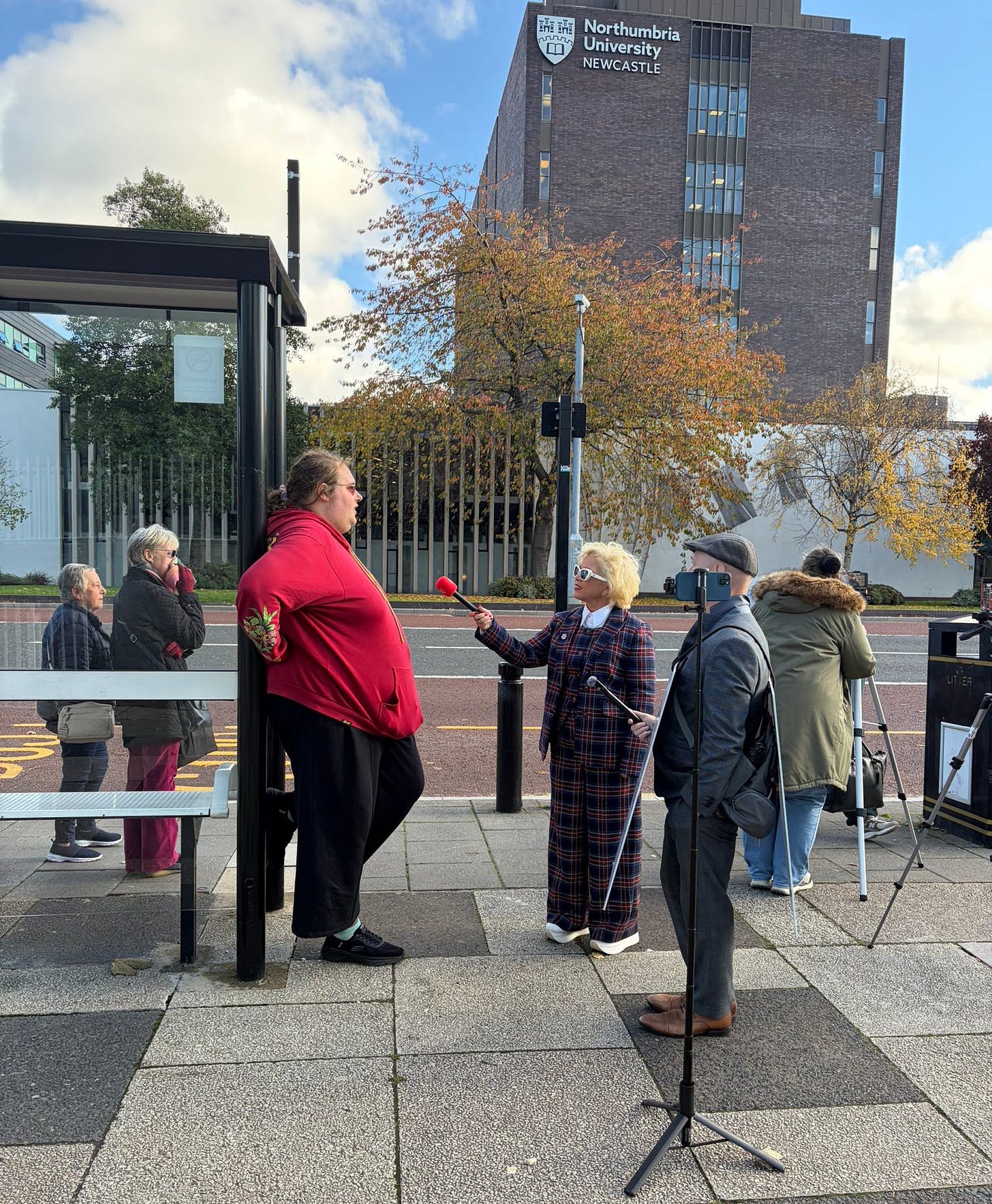New Zealand Labour Party finally launches policy and falls flat on its face
Labour’s first real policy drop looked like a hastily thrown-together PowerPoint deck rather than a carefully thought-out strategy. Chief among the missteps was the so-called NZ Future Fund which was supposedly Labour’s grand economic vision to channel dividends from Crown assets into New Zealand businesses and infrastructure.
Trouble is, when asked which businesses would actually benefit, Chris Hipkins couldn’t name one. Costings? Non-existent. Specific assets? No clue. Not exactly the kind of clarity or competence you’d hope for from a party trying to convince us that they are fit to return to office. Read Roger Partridge’s excellent piece on the Future Fund.
Then Labour announced it wants to boost the rebate for the game development sector from 20% to 25%, lower the spend threshold, and raise caps. On the surface, supporting a growing tech sector sounds fine, but really it is the same old “picking winners” approach that hasn’t worked for Labour before.
And if that weren’t enough, Hipkins also managed to trip over his own health announcement. The GP funding policy was meant to be a centrepiece of Labour’s social offering. A plan to boost access and ease pressure on primary care. Instead, it turned into a communications car crash when Hipkins was caught off guard and clueless that the announcement had been made, clearly unaware of key details, and ultimately had to eat humble pie.

Source: Mark Mitchell
Mega-Strike or Mega-Mistake? Have the Unions overplayed their hand
The so-called “mega-strike” involving tens of thousands of teachers, nurses, and public servants has reached a stalemate. The Government has come out swinging, with Public Service Minister Judith Collins labelling the strike “unfair, unproductive, and unnecessary.” She argues it’s the public who will pay the price; parents without childcare, patients without appointments, and taxpayers funding both sides of the standoff.
What makes this all the more interesting is that not everyone in the education sector has chosen confrontation. The Primary Principals’ Collective Bargaining Union (PPCBU) quietly reached a deal with the Ministry of Education without walking off the job. The contrast is stark: while one group resolved things through dialogue, others escalated risking alienating the very public whose support they need as it looks more and more like a political stunt for Labour distracted by irrelevant issues like Palestine.

Protestors from the Mega-Strike holding Palestine signs. Source: NZ Herald Instagram.
According to Newsroom, the impasse has become so entrenched that the Employment Relations Authority has now been called in to mediate between the government and union representatives. That’s not standard procedure. It’s a sign that both sides are dug in deep.
Captain Chip-o-crite and Labour’s Mega-Strike amnesia
Chris Hipkins’ transformation from the man who froze public-sector pay to the man now applauding mass strikes is a feat of sheer audacity. Labour has rediscovered its love of unions, cheering on the “mega-strike” and accusing the current Government of being hostile to workers; conveniently forgetting that when the shoe was on the other foot, they were the ones doing the kicking.
Back in 2019, as Education Minister, Hipkins oversaw the last so-called “mega-strike,” when 50,000 teachers and principals walked off the job in protest at low pay and impossible workloads. It was the largest education strike in New Zealand history and the unions were furious at what they saw as Labour’s betrayal of its promise to fix education. Thousands of teachers marched in the streets demanding “rights and respect,” while Hipkins warned them, “expect disappointment.” That line became the perfect summary of Labour’s relationship with the sector it claimed to champion.

Two years later, Hipkins doubled down with a public-sector pay freeze for anyone earning over $60,000 citing fiscal restraint while nurses, teachers, and public servants battled rising costs of living.
Fast forward to 2025, and the same Chris Hipkins is now standing shoulder-to-shoulder with the unions, decrying the government for not doing enough. It’s an extraordinary act of political amnesia and a reminder that for Labour, workers are only heroes when they’re striking against someone else’s government.
The rental market swings toward tenants
For the first time in years, the power balance in New Zealand’s rental market is shifting and this time, it’s in favour of tenants. New data from Trade Me Property shows that the number of rental listings nationwide rose by more than 6% in September compared to last year, while the median advertised rent slipped by 1.6%.
The regional picture tells the story even more clearly. Wellington rents are down about 7% year-on-year, with notable drops also in Northland (-6.5%), Marlborough (-3.4%) and Hawke’s Bay (-3.1%). Only Canterbury went the other way, recording a modest 1.8% rise, a sign of its still-strong post-quake housing demand.
Trade Me attributes the easing to a surge in available stock and a slowing economy that’s curbing tenant competition. Landlords, once spoilt for choice, are now trimming rents or sweetening deals to secure good tenants.
Luxon’s $7m or $10.5m Waiheke beach house creates an optics problem
Christopher Luxon has just received a tidy rates reduction on his multi-million-dollar Waiheke Island property after challenging its council valuation. The property, initially valued at $10.5 million, was reassessed down to $7 million, slicing about $8,000 off the annual rates bill. Perfectly legal, perfectly normal. But politically? Not ideal.
Let’s be clear, though, this wasn’t “rates relief” as quickly became the line; no doubt having been circulated in Labour WhatsApp groups. Auckland Council doesn’t hand out discounts willy-nilly. Rates are calculated as a proportion of a property’s capital value (CV) relative to the total value of all properties in the city. Luxon’s rates dropped because the value of his property, according to council valuers, dropped.
But, in politics, facts often play second fiddle to perception. The Luxons’ revaluation may have followed a standard, transparent process available to every ratepayer, but it looks bad. It’s not that Luxon did anything wrong. He didn’t. But optics matter. It reinforces the narrative that he is a rich prick wildly out of touch with everyday Kiwis.
I had a yarn with Duncan Garner about this on his podcast this week.
Four MPs from three different parties on a rare bipartisan road trip
Every now and then, a story cuts through the noise of partisan bickering and spin-doctoring to remind us that politicians are, in fact, human beings. This week it came in the form of a seven-hour road trip from Tauranga to Wellington after a flight cancellation forced a group of MPs, from both sides of the House, to pile into a car together and hit the road.
Tom Rutherford and Sam Uffindell from National, Cameron Luxton from ACT, and Labour’s Jan Tinetti formed what Luxton dubbed “a temporary cross-party committee called the ASX caucus” after the Mitsubishi ASX they hired. The MPs described a pleasant trip including a stop for pies, debate about transport policy, and wide ranging conversation. The lone woman and leftie, Jan Tinetti said “we talked heaps - well Cam talked heaps.”

Four MPs on a roadie. Source: Tom Rutherford
🇺🇸 🇦🇺Trump v Rudd: the diplomatic cringe heard around the world
In a moment of classic Trump theatre, President Donald Trump told Australian ambassador (and former Aussie Prime Minister) Kevin Rudd that he “doesn’t like him” during a White House meeting. To be fair, Rudd had made it abundantly clear that he does not like Trump first.
In what was meant to be a positive diplomatic encounter for the US–Australia partnership, the atmosphere shifted when an Australian reporter asked Trump about Rudd’s previous criticisms of him.
Trump blinked and asked current Australian PM Anthony Albanese, “Where is he? Is he still working for you?”, upon which Albanese pointed to Rudd across the table. Rudd responded that his past remarks occurred “before I took this position, Mr President.” Trump didn’t pause, and simply stated: “I don’t like you either. I don’t. And I probably never will.” The cabinet room reportedly erupted in laughter.
The Biscuit Tin strikes again: Social Media (Age-Restricted Users) Bill drawn
Every so often, Parliament’s biscuit tin coughs up a Bill that forces a proper national argument and this week it’s Catherine Wedd’s Social Media (Age-Restricted Users) Bill. The idea sounds straightforward: restrict social-media access for under-16s to shield kids from explicit content and digital addiction. And given the mountain of research and the radicalising effect of Jonathan Haidt’s The Anxious Generation, linking phones and social media to rising teen anxiety and depression, it’s not hard to see why the proposal resonates with some.
But the method matters. Enforcing age limits online could mean identity checks, more surveillance, or even state-sanctioned gatekeeping of who gets to speak or listen. Every “child-safety” rule risks turning into a speech-control mechanism once the wrong people get hold of it.
I’m torn. Deeply. Protecting kids is a priority, but giving government or Big Tech the power to decide who can be online carries its own dangers. This is exactly what I’ll be unpacking with Eric Crampton and Andrew Cushen at the Free Speech Union AGM on 8 November at the Christchurch Town Hall. Would love to see you there!
Helen Joyce will be there too!!!!
The Long Fight Over New Zealand’s Coastline
Parliament this week passed the Marine and Coastal Area (Takutai Moana) Amendment Bill, finally addressing a battle that began with Labour’s Foreshore and Seabed Act 2004, which vested ownership in the Crown and triggered mass Māori protest. National repealed that law in 2011, replacing it with the Marine and Coastal Area Act, a compromise allowing iwi to seek “customary marine title” if they could prove continuous and exclusive use since 1840.
But over time, court rulings broadened the definition of “exclusive use,” leading to hundreds of overlapping claims and what many saw as judicial overreach. The new amendment, promised in the NZ First–National coalition agreement, tightens the legal test, limits overlapping claims, and reaffirms that the coastline remains open to all New Zealanders. Two decades, three governments, and countless legal battles later, Parliament has finally drawn a line in the sand. Unless the next Labour government decides to repeal it…
In short - other stuff that happened:
- Winston Peters participated in the Oxford Union Debate in the affirmative of the proposition ‘This House Believes That the Courts Now Undermine Democracy’. You can read his official speech here.
- Sanae Takaichi made history becoming Japan’s first female prime minister.
- A ferocious windstorm hit the lower North Island and parts of the South Island, with gusts reaching up to 230 km/h, causing power outages, major flight disruptions and tragically, at least one fatality from a falling tree branch in Wellington.
- Biosecurity regulators are on high alert after a yellow-legged hornet queen was discovered in Auckland. Authorities have warned the public to keep an eye out for the pest and report sightings.
- Peter ToRot was canonised as Papua New Guinea’s first ever saint. His martyrdom during WWII and unwavering faith was celebrated across the nation.
- A boy identifying as a girl beat the 11 year old granddaughter of Olympic Gold Medallist Faith Leech in a track event in Australia, meaning the girl missed out on qualifying for the regional event. Her father laid a complaint with Victoria’s Department of Education, but it was rejected.
- The life-changing cystic-fibrosis drug Trikafta is under consideration on the Options for Investment (OFI) list by Pharmac in New Zealand, raising hopes for families who’ve had to move overseas for treatment.
- Marama Davidson, co-leader of the Greens, apologised after her “Right to Repair” Bill was discharged when she arrived too late to speak, meaning the legislation she’s championed is unlikely to progress further.
- The backlog in the District Court has been cut by around 20% (about 1,700 fewer criminal cases) since April 2023, with the Government attributing the improvement to its Timely Justice Programme and prioritised judicial resources.
- 30 year old Australian food influencer Stacey Hatfield died from an “unforeseen and extremely rare complication” shortly after the home birth of her baby boy.
- At the Global Cybersecurity Forum 2025 in Riyadh, leaders from over 80 countries warned that cybersecurity is no longer just a tech issue but a core geopolitical battlefield in the age of hybrid war.
- ACT MP Laura McClure’s Deep Fake Harm and Exploitation Bill has been pulled from the biscuit tin.
- A posthumous memoir by Virginia Giuffre, Nobody’s Girl is making waves. It points the finger at more powerful men and has seen Prince Andrew relinquish what was left of his titles.
- World Aquatics has suspended Hannah Caldas from women’s swimming for 5 years after a refusal to undergo sex-verification screening to prove eligibility in the women’s category…

Stuff I found interesting this week (note the fact I find stuff interesting does not mean I agree with it in part or entirely):
- In Quillette’s “The Melbourne Crimewave”, Andrew Bushnell argues that Melbourne’s surge in youth gang violence and machete attacks is symptomatic of deeper socio-political failures under Victoria’s long-serving Labor government. He links the spike in crime to bail-law leniency, mass immigration, infrastructure strain and an offender-centric justice system that neglects victims.
- Dan Williams’ essay “Is Social Media Destroying Democracy — Or Giving It To Us Good And Hard?” argues that platforms like Facebook and X aren’t wrecking democracy, they’re exposing it. He suggests social media’s chaos comes from its democratising effect, tearing down old media gatekeepers and giving everyone, for better or worse, an equal voice. The result isn’t algorithmic evil, but the unfiltered will of the people, something the elites find far more unsettling. It’s a sharp, provocative read that reframes the whole debate about digital platforms and democratic decline.
- In his blog post “Broadcasting Standards Authority Power Grab: Post 1,” Barrie Saunders revisits a 1990 broadcast controversy involving TVNZ and the New Zealand Business Roundtable, using it as a lens to argue that the BSA once served as a meaningful check on powerful broadcasters but is now overreaching in the streaming era. He warns that extending regulatory reach over smaller, less-resourced online platforms risks weaponising the regulator and undermining free speech.
- In “We Need to Talk About Trans‑Identified Killers”, authors Forest Romm and Kevin Waldman survey a series of violent attacks carried out by individuals who identify as transgender, arguing that the intersection of gender-dysphoria, mental-health disorder and extremist ideology deserves more scrutiny. They contend the media’s reluctance to report “deadnames” avoids grappling with the underlying motivations and obscures patterns among these perpetrators. The piece is a provocative call to examine how identity, grievance and ideology may combine in rare but extreme criminal acts.
Kellie-Jay Keen AKA the incredible Posie Parker talking to a man who says he is a woman outside the tribunal for the Darlington Nurses. #LetWomenSpeak

Ani O'Brien comes from a digital marketing background, she has been heavily involved in women's rights advocacy and is a founding council member of the Free Speech Union. This article was originally published on Ani's Substack Site and is published here with kind permission.


No comments:
Post a Comment
Thank you for joining the discussion. Breaking Views welcomes respectful contributions that enrich the debate. Please ensure your comments are not defamatory, derogatory or disruptive. We appreciate your cooperation.